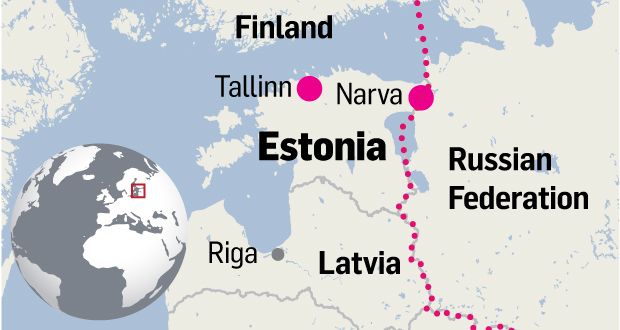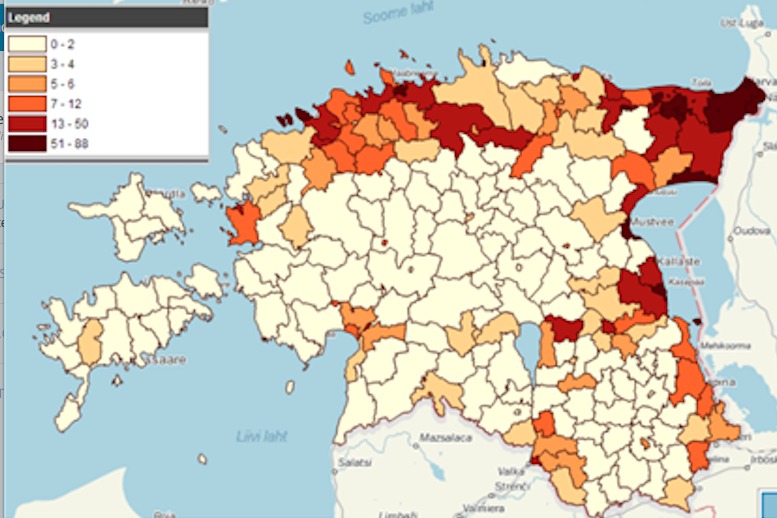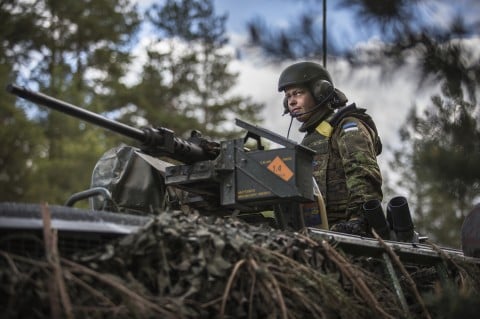The small Baltic nation of Estonia was considered a “vassal” state (Soviet Republic) within the U.S.S.R. from the time of its invasion and occupation by Soviet forces on June 17, 1940 until August 20, 1991 when it declared its independence along with Latvia and Lithuania during the dissolution of the Soviet Union. The only break in that occupation was a brief period during 1941-1944 when Soviet forces retreated while Estonia was invaded and occupied by Nazi Germany during World War II, after which, the Soviet occupation resumed. Since the illegal annexation of Crimea by Moscow in 2014 and its subsequent undeclared war against Ukraine in the eastern Donbass region later that same year, Estonia has felt increasingly vulnerable to Russian aggression. However, this tiny NATO member with a population of only slightly more than 1.3 million wants the Kremlin to know that they are ready for any aggressive actions and have pledged to make any Russian invasion extremely costly for Moscow.
The three Baltic States of Estonia, Latvia and Lithuania officially joined NATO on March 29, 2004. True to its historic paranoia of encirclement by foreign invaders, Russia saw this event as direct threat to its national sovereignty and reacted with hostility. The national sovereignties of Estonia, Latvia and Lithuania that were smashed by the Soviet invasion in 1940 and the decades long occupation that followed did not of course, enter into the thinking of the perpetually aggrieved Russian leaders.
In all fairness to Russia, I do believe that another avenue for guaranteeing Baltic security could have been accomplished without unnecessarily antagonizing Moscow. In my opinion, having three former Soviet Republics that are located directly on Russia’s northwestern border simultaneously join NATO was an action that constituted an uncalled for provocation, a blatant political poke in the eye. I stated at the time of the collapse of the Soviet Union in 1991 and again throughout the 1990’s and early 2000’s, a once in a generation opportunity was lost when the U.S. and NATO failed to successfully follow through on incorporating Russia into the mutual security and economic alliance known as the NATO-Russia Founding Act that was enacted in May of 1997. This was a rare opportunity to bring together two historic nuclear armed rivals to work together for the common good, with the very real possibly of entering into a lengthy period of international peace and stability.
But that was not to be. To be blunt, NATO blew it. To this day I sincerely believe the timing was right for such an alliance, and I further believe that Russia would have actually welcomed being an equal partner with NATO. But that is a story for another time.
Today, Estonia and Russia face off against each other across the Narva River located on the eastern border of Estonia with the focal point being the small Estonian city of Narva. A Cold War mentality plays out across this international river and the hostility felt by the Estonian forces guarding the homeland from their Russian antagonists is as harsh and unforgiving as the frozen ground during the long winter. A clear example of the threat felt by Estonia from Russia is summed up in a quote from an official Estonian military and intelligence assessment from earlier this year:

Almost all security threats in the Baltic Sea region stem from Russian activity. Russia’s covert influence operations, economic pressure, aggressive foreign policy, as well as Cold War-style military activity and the deployment of weapons along the borders of the Baltic states, destabilize the security of the Baltic Sea region. The only existential threat to Estonia’s sovereignty is a potential Russian military operation against the Baltic states.
That could not be any clearer. But is the perceived existential threat of a Russian invasion into Estonia based on any verifiable intelligence or actions? Do the Estonian military and intelligence establishments base the threat of Russian aggression solely on their proximity to the Russian border? Perhaps the large number of native Russian speakers dominating the eastern river city of Narva gives them reason to fear that Moscow will use that as a justification for an annexation of that region just like it did in Crimea? That is a tempting idea for Moscow since Narva’s population remains overwhelmingly Russian-speaking and ethnically Russian, just like Crimea and large areas of the Donbass in eastern Ukraine. If these ethnic Russians claim mistreatment by the Estonian government and appeal to Moscow for help, will little green men with Russian military vehicles, weapons and equipment suddenly appear on the banks of the Narva?

A 2019 study conducted by RAND Corporation, an American think-tank funded by the U.S. government, suggested they (Estonia) could be invaded and isolated by the Russians in a matter of hours. That does not appear to be idle paranoia. However, Moscow does not have to rely on a traditional frontal attack across the Narva River in order to commence hostilities against Estonia. In fact, Russia has already conducted a major attack against Estonia: a cyber-attack.
In April of 2007 several Estonian governmental and financial institutions were the subjects of relentless blunt force cyber-attacks that lasted weeks causing major disruptions to commerce and the national economy. Riots instigated by ethnic Russians and supported by Russian based, Kremlin-backed organizations blazed throughout Tallinn for several days and caused a massive amount of property damage, numerous injuries, but fortunately, no fatalities. The ISPs of the originating computers used in the cyber-attacks were all based in Russia, but of course, the Kremlin denied any involvement in the actions, and since no one was killed as a direct result of the cyber-attacks, NATO could not, according to its charter, retaliate. Nevertheless, Tallinn regarded that action as an act of war. They were determined to never again be a passive victim of any such aggression from Moscow.
In addition to a 60,000 strong military and standing up a robust and ever expanding defensive and offensive cyber warfare capability, Estonia has formed a militia of irregulars, civilians, that would be used as a backup, or partisan force in the event that Russia launched a physical invasion onto Estonian soil. This force is called the Estonian Defense League and is composed of veterans of the regular armed forces, some of which were in the Estonian special forces. Their morale is high and their commitment is total. One of the founders of the Estonian Defense League and the current commander of the Estonian Special Operations Force, Colonel Riho Uhtegi, had a stark warning to any Russian military commanders considering an invasion of Estonia: “They can get to Tallinn in two days. But they will die in Tallinn. And they know this.”
In the spring of 2020 with the coronavirus raging in more than 211 countries, more than 120,000 deaths and the peak of this global pandemic not yet in sight, it is inconceivable that Moscow will attempt any overt military action against Estonia or any other Baltic state in the near future since Russia itself is now experiencing an explosion of infections and deaths. However, it is not possible to predict what the post pandemic world will look like and which stronger nations may try to impose their will on other, weaker nations. It is quite conceivable that a mostly unscathed, post pandemic Russia could initiate a cyber-attack on Estonia and then follow up with a swift, multi-pronged and overwhelming, well-coordinated attack on a still weakened NATO and try to reclaim a former Soviet republic that Putin genuinely believes should never have been allowed out of the Russian orbit.
The Estonians will surely fight any such attempt with all the passion, strength and resources at their disposal and they will make Russia pay for every inch of Estonian soil. NATO must insure they do not fight alone.
Author
-

Retired U.S. Army Counterintelligence Special Agent. He served in Iraq as a team leader of a tactical Human Intelligence Team (THT). Prior to his deployment to Iraq, David was an instructor at the reserve U.S. Army Counterintelligence Special Agent course. He has published four novels for Grand Central Publishing and is currently finishing a memoir of his experience in Iraq. David has also written articles for Vanity Fair, Salon.com, The American Prospect and The Washington Monthly.
View all posts




